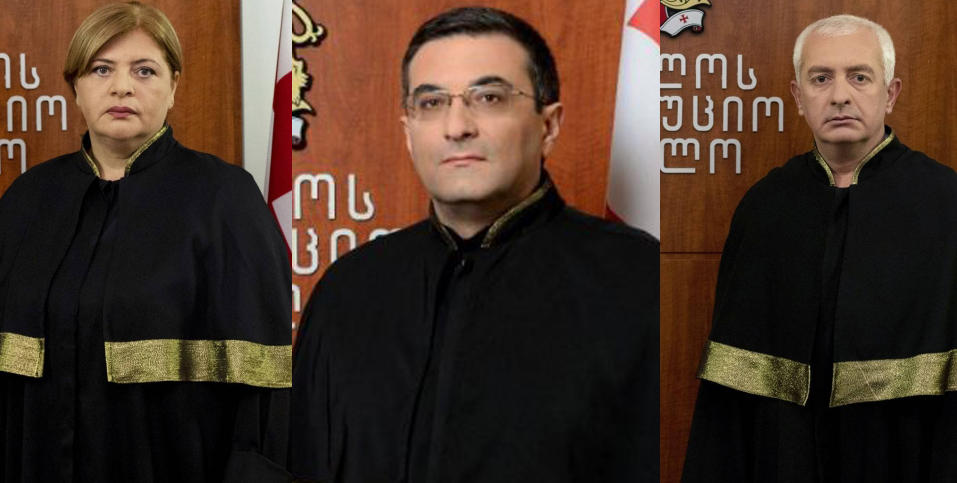
The Constitutional Court creates a formal and legal basis for political visions, according to which the President of Georgia may be dismissed due to the violation of the Constitution on the grounds of loss of trust in him/her, - three judges of the Constitutional Court, Irine Imerlishvili, Giorgi Kverenchkhiladze and Teimuraz Tughushi say in a dissenting opinion relating to the decision of the Constitutional Court on the impeachment of the President.
According to them, the Constitution of Georgia does not provide for the dismissal of the President of Georgia due to the loss of trust in him by other branches of the government.
According to the authors of the dissenting opinion, the authors of the constitutional submissions and the representative of the Government of Georgia did not even indicate that the mentioned three visits or any actions taken by the President of Georgia within the framework of it damaged the process of implementation of foreign policy by the Government of Georgia or were against the country’s foreign policy.
"When implementing foreign relations, all constitutional institutions, including the President of Georgia, are obliged to support the Georgian Government in conducting foreign policy and not to damage the foreign political goals that the government aims to achieve. We share the position of our colleagues that in foreign relations, the President should try to act with political prudence, so that his/her political statements are coordinated with the government and are not perceived differently from the government's position. Our colleagues essentially correctly interpret the balance of the distribution of powers between the President of Georgia and the Government of Georgia provided for by the Constitution of Georgia, when they point to the ceremonial role of the President of Georgia as the head of state, and consider the Government of Georgia as a body equipped with the function of determining and implementing foreign policy strategy. Also, we share the reasoning that the actions taken by the President of Georgia outside the country may damage the foreign policy of the Government of Georgia. However, neither the authors of the submissions nor our colleagues indicate that by the disputed visits or the opinions expressed within them the President of Georgia harmed in any way or prevented the implementation of foreign policy by the Government of Georgia. Regarding the disputed visits, it is known to the court that the President of Georgia met with the President of the Federal Republic of Germany, the President of the French Republic and the President of the European Council. At the same time, there is no evidence in the case that the President of Georgia voiced messages that are against the foreign policy of the Government of Georgia or spoke about issues that somehow went beyond her ceremonial role as the head of state, or took an action that damaged the foreign policy of the Georgian Government. Neither the Government of Georgia nor the authors of the constitutional submissions indicate that they did not want any message to be conveyed to the addressee of the meeting or whether any meeting in general was contrary to the Government's chosen foreign policy strategy.
There is no evidence presented in the case about the obstruction of the implementation of the foreign policy by the President of Georgia. Moreover, the authors of the constitutional submissions and the representative of the Government of Georgia do not even indicate that the mentioned three visits or any actions taken by the President of Georgia within the framework of them damaged the process of implementation of the foreign policy by the Government of Georgia or were against the foreign policy.
Thus, the evidence presented in the case does not indicate that the foreign policy of the Georgian Government was damaged by the action of the President of Georgia. Accordingly, in fact, our colleagues approved the dismissal of the President of Georgia on the grounds that she may prevent the implementation of foreign policy by the Government of Georgia in the future. As a result, the Constitutional Court of Georgia creates a formal-legal basis for political visions, according to which the President of Georgia may be removed from his/her position due to the violation of the Constitution on the grounds of loss of trust in him/her. We believe that the Constitution of Georgia does not provide for the dismissal of the President of Georgia due to the loss of trust in him/her by other branches of the government. The initiators of the impeachment and the Constitutional Court of Georgia should react to the facts that have already happened and assess the action of the President of Georgia as contrary to the Constitution of Georgia only if it goes beyond the scope of authority, violates the competence of the government or other constitutional bodies, and/or another interest protected by the Constitution of Georgia. In the present case, the existence of any of the above was not clearly identified.
Based on all of the above, we believe that the evidence presented in the case does not show that by making the disputed visits, the President of Georgia exceeded the scope of her authority or by her actions prevented the Georgian Government from implementing its foreign policy. Thus, in this case, the evidence presented in the case does not create a basis for determining that the President of Georgia acted against the Constitution of Georgia," reads the document.
For information, the mentioned three judges did not share the conclusion of other 6 judges of the Constitutional Court that the Constitution was violated by the President's unauthorized visits to Europe.
v-if="article.gallery" v-html="article.gallery"
(adsbygoogle = window.adsbygoogle || []).push({});